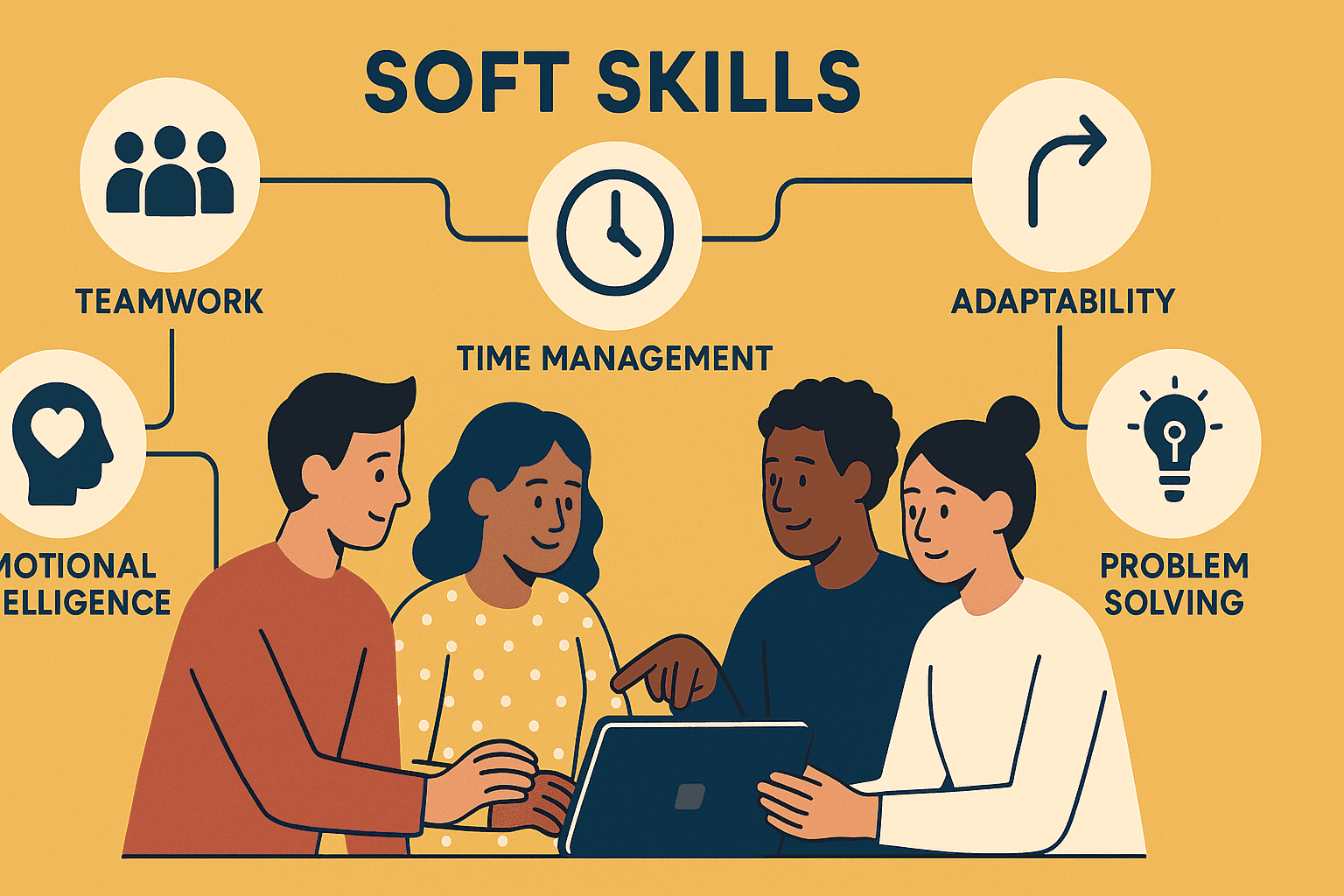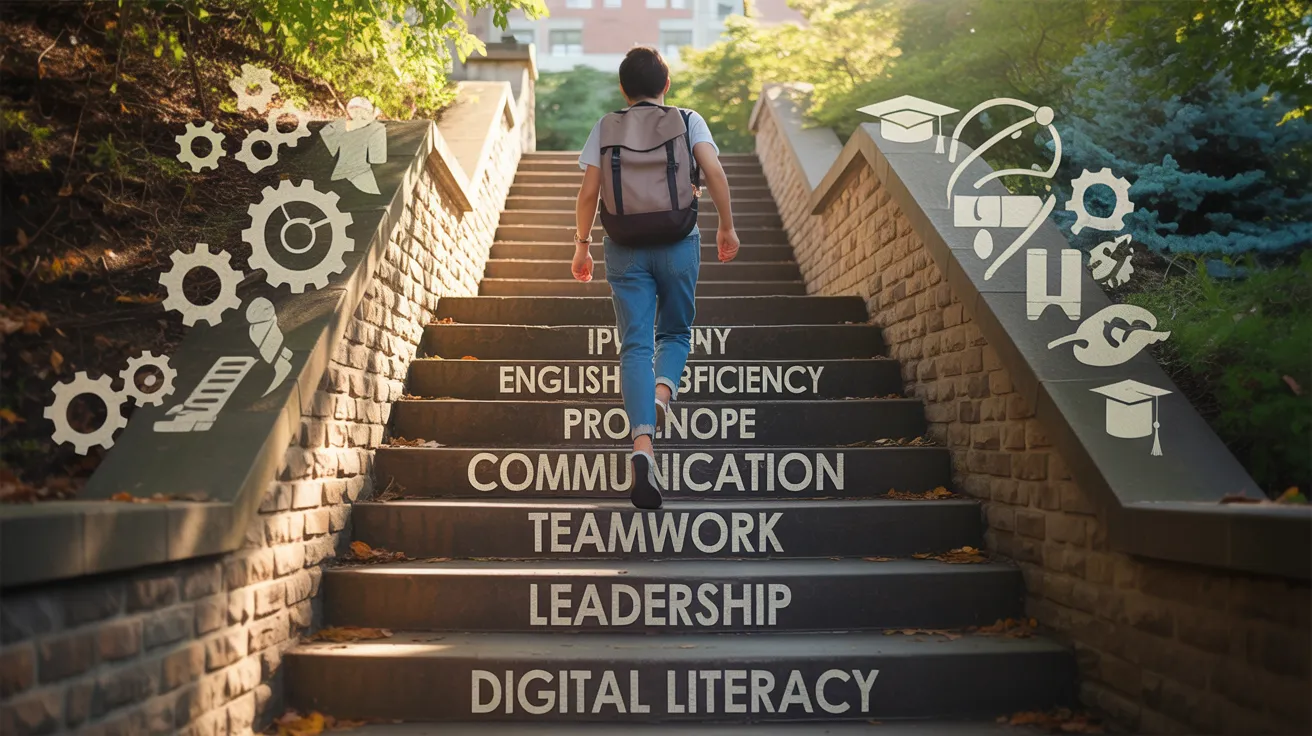Equipping Students with English Proficiency and Essential Skills for Future Careers
Equipping Students with English Proficiency and Essential Skills for Future Careers
These days, getting good grades is just one part of the picture. If students want to really thrive in the modern job market, they will need a lot more than strong report cards. It’s just as important for them to be clear communicators, flexible thinkers, and emotionally aware individuals. And at the heart of it all? Solid English skills.
No matter what your child wants to be, an engineer, a designer, a coder, or something else entirely; being able to speak and write confidently in English opens a lot of doors. That’s where platforms like Codeyoung comes in. Their programs don’t just teach grammar or vocabulary; they help kids develop real communication skills, collaborate better, and prepare for the kinds of challenges they will actually face out in the world.
The Role of English Skills in Academic and Career Growth
Fluency in English is not only just helpful, infact it’s a critical skill. As the most widely spoken language in global business, science, and education, English is the medium through which students unlock global opportunities. Mastering English skills especially reading, writing, speaking, and listening prepares learners to communicate effectively and succeed in a variety of career fields.
Why English Matters:
English is the language of global communication: From international meetings to professional emails, effective communication skills in English allow students to interact effectively with people across borders and build meaningful relationships.
Academic performance and competitive exams: English fluency supports students in scoring well in standardized tests and entrance exams, which are often language-heavy and assess both comprehension and clarity.
Better workplace communication: Students with good communication skills are better able to present ideas, write reports, and engage with leadership teams, enhancing their career advancement and professional image.
Mastering English is not just learning grammar and vocabulary. It’s also about being able to communicate clearly and effectively, adapt to cultural differences, and share ideas with confidence in the real world.

Developing Communication Skills for Career Readiness
Having strong English skills is a huge advantage but knowing how to use that language in real-life, professional settings is what really counts. These days, employers aren’t just looking for people who can write well. They want strong communicators, students who can share ideas clearly, listen carefully, and adjust to different communication styles when working with others.
So what does that look like in practice? Let’s break it down:
Verbal and written communication: Whether it’s drafting a professional email, putting together a resume, or giving a class presentation, these tasks help students turn their classroom English skills into tools they’ll actually use in the workplace. These experiences also build confidence in public speaking and help prepare for future client-facing roles.
Active listening and thoughtful responses: It’s not just about talking. Good communication means really paying attention, too. When students learn to ask clarifying questions, make eye contact, and read nonverbal cues, they become more respectful and aware listeners. These habits are key to becoming an effective communicator and make a big difference in leadership and conflict resolution later on.
Digital etiquette and group dynamics: From Zoom calls to shared documents and group chats, modern students spend a lot of time interacting online. Understanding how to write with professionalism, respond respectfully, and contribute to a group discussion is a must. Strong digital communication skills are now just as important as face-to-face interaction, especially in remote work settings.
When students develop these communication skills early, both online and offline, they grow into confident individuals who can handle interviews, take initiative in team settings, and express themselves clearly. And in a world where being understood is everything, that kind of preparation goes a long way toward career readiness and professional success.

Essential Soft Skills for Students to Prepare for the Future
Academic knowledge will get you the interview but soft skills will help you get the job and keep it. While hard skills are specific to tasks and tools, soft skills refer to how students behave, adapt, and connect with others. These are increasingly important for workplace success and leadership roles.
Must-Have Soft Skills for Future Careers:
Critical thinking and problem solving: Employers value students who can analyze information, break down issues, and find solutions using logic and creativity.
Emotional intelligence and collaboration: Understanding one’s own emotions, practicing self-awareness, and showing empathy help students build strong relationships and work well in diverse teams.
Time management and adaptability: The ability to prioritize tasks, meet deadlines, and adapt to change prepares students for the fast pace of modern workplaces.
Creativity and a growth mindset: Thinking outside the box, experimenting, and learning from mistakes fosters innovation, a trait every company looks for in young talent.
These skills can’t be memorized from a textbook. They come from continuous learning, reflection, and real-world experiences where students interact, adapt, and grow.
Career Skills Every Student Should Develop
Beyond school subjects and test scores, students need a toolkit of real-world job skills to thrive in evolving industries. Today’s roles demand flexibility, digital awareness, and a blend of technical and interpersonal skills.
Career-Building Skills That Matter:
Goal-setting and self-management: Knowing how to define professional goals, plan steps, and stay motivated is key to long-term career development.
Basic digital literacy: Being comfortable with productivity software, browsers, and communication tools is now expected. Students should be familiar with digital technologies they’ll encounter in any career field.
Collaboration and communication strategy: The ability to work in a team, manage conflicts, and collaborate effectively, especially in virtual settings is a defining trait of workplace-ready individuals.
Entrepreneurial thinking and leadership: Encouraging students to take initiative, admit mistakes, and pursue creative ideas builds future entrepreneurs and team leaders.
Critical thinking and decision-making: Students must learn how to assess situations, evaluate evidence, and make informed choices. Critical thinking enables them to solve problems efficiently, a skill employers highly value across industries.
Adaptability and resilience: Today’s job market changes rapidly. Students who can remain calm under pressure, shift with new demands, and handle uncertainty are better prepared for long-term career success and leadership roles.

Equipping students with both hard skills and soft skills ensures they can lead, contribute, and grow wherever their career takes them. By developing a growth mindset and real-world readiness, we prepare young learners not just to survive change but to thrive in it, shaping the future with confidence and creativity.
Practical Ways to Strengthen English and Communication Skills
Building English skills and communication abilities doesn’t require a special class. It can be integrated into daily habits. Parents, teachers, and mentors can help students develop these essential abilities starting today.
Actionable Tips for Language and Communication Growth:
Read daily: Reading books, blogs, or even news articles strengthens vocabulary, improves comprehension, and supports verbal communication.
Journaling and writing exercises: Encouraging kids to write stories, reflections, or summaries helps them express ideas clearly and work on sentence structure and tone.
Group projects and peer interaction: Working in teams promotes interpersonal skills, active listening, and teaches students how to communicate clearly and effectively.
Mock interviews and debates: Practicing public speaking, role-plays, and debates boosts confidence and teaches structure, persuasion, and nonverbal communication cues like body language and eye contact.
Use of digital tools: Platforms like Codeyoung offer structured programs that combine language learning with real-world applications, helping students practice, improve, and gain feedback in real time.

Incorporating these into your child’s routine promotes a confident, articulate, and well-rounded learner, someone prepared to lead, adapt, and succeed in tomorrow’s dynamic world. With the right guidance and platforms like Codeyoung, students can unlock their potential and grow into skilled, future-ready professionals.
How Strong Soft Skills Shape Career Opportunities for Students
In today’s competitive job market, having technical know-how isn’t enough. Employers are paying close attention to how students communicate, work with others, and adapt in real-world situations. That’s where soft skills come in and they are now considered just as important as hard skills when it comes to hiring decisions and career advancement.
Companies want more than academic success. They are looking for strong communicators, problem solvers, and future leaders who can collaborate effectively, show emotional intelligence, and contribute to building healthy relationships at work.
Why Soft Skills Make a Difference:
Career success and salary potential: Students with soft skills stand out in interviews, adapt faster to new roles, and often see quicker career advancement.
Better decision-making and leadership: Those who show self-awareness, resilience, and empathy are often chosen for leadership and professional development roles.
Increased workplace harmony and retention: Individuals who can resolve conflicts, give feedback constructively, and maintain positive relationships contribute to a healthier work culture.
Ultimately, a student who can combine technical know-how with emotional and social intelligence becomes a well-rounded, future-ready professional.

Conclusion
The world is changing fast, and the skills our children need to succeed are evolving just as quickly. Building English proficiency, effective communication skills, and a strong foundation of soft skills gives students a real advantage, not just in school, but in life.
When students can communicate effectively, collaborate across cultures, and adapt to new challenges, they become the leaders, creators, and changemakers of tomorrow. That’s why platforms like Codeyoung play a vital role in equipping young learners with future-ready competencies. By combining structured learning with real-world application, Codeyoung helps students grow into confident communicators and lifelong learners.
Let’s empower them today, so they are ready for any path they choose tomorrow.
English Skills – FAQs
Why are English skills important for students preparing for future careers?
English skills help students succeed academically, build confidence, and connect globally. Proficiency supports entrance exams, interviews, and team collaboration, all of which are essential in international and competitive career fields. Good command of English also opens doors to top universities and cross-cultural job opportunities.
How do strong communication skills enhance professional success and leadership?
Students with strong communication skills can present ideas clearly, influence decisions, and build trust in teams. From public speaking to everyday interactions, being an effective communicator supports leadership, conflict resolution, and collaboration, critical for career advancement and team success.
What are the most valuable soft skills for students entering the workforce?
The most important soft skills include critical thinking, emotional intelligence, time management, problem solving, and strong interpersonal skills. These skills help students adapt, build meaningful relationships, and handle challenges confidently in diverse, fast-paced work environments.
How can students improve their career skills while still in school?
Students can develop career skills by joining clubs, doing internships, attending workshops, and practicing public speaking. Writing, reading, and digital platforms like Codeyoung also help build English skills and real-world experience while still in school.
What is the importance of communication skills in professional life, and how can they be developed?
Communication skills are crucial in the workplace. They affect how we lead teams, interact effectively, and solve problems. Students can build these skills by practicing listening, participating in debates, receiving feedback, and using tools like email and chat in structured, thoughtful ways.
How do important skills like adaptability and teamwork influence career growth?
Employers highly value professionals who can adjust quickly and work well with others. Adaptability, along with the ability to collaborate effectively, ensures long-term success in any field. These traits foster innovation, reduce conflict, and enable professionals to handle change with a positive attitude.
Comments
Your comment has been submitted